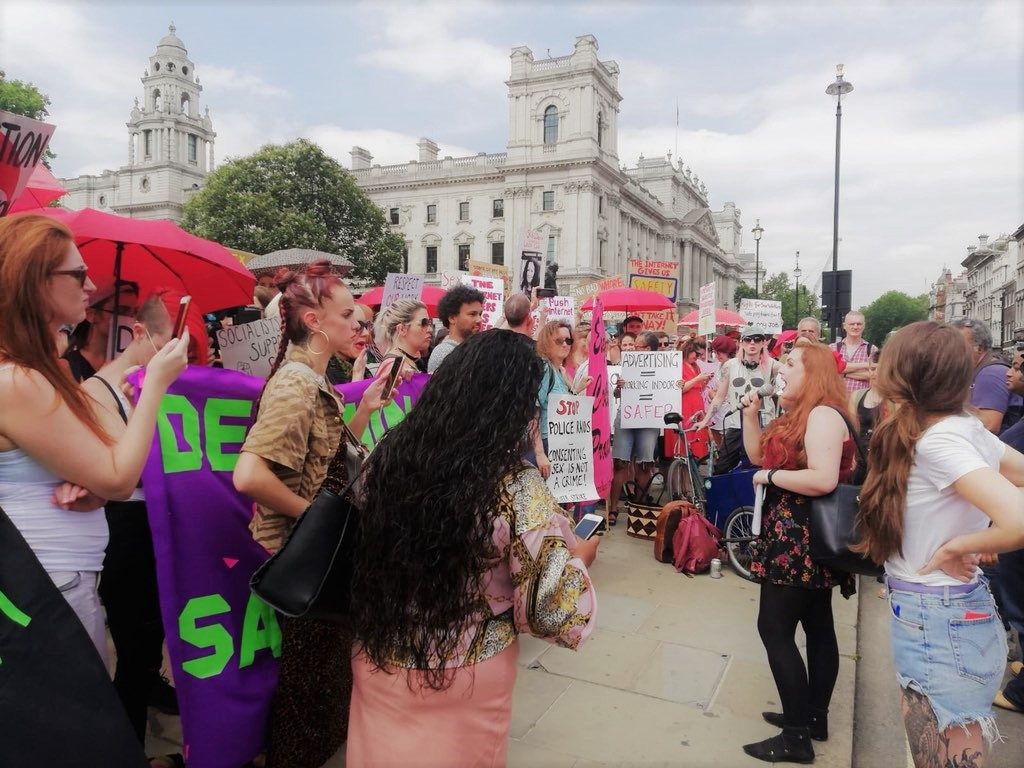The narrow space left in UK law for sex workers to operate in is under threat of being further restricted, writes Taisie Tsikas.

On 4 July 2018 Sarah Champion MP led a debate in the House of Commons arguing for the UK to mimic legislation passed in the US that would prevent sex workers from advertising online. Champion made the call to ban “prostitution websites” on behalf of the self-appointed All-Parliamentary Party Group (APPG) on the issue, which was made up of three other Labour MPs (including Jess Phillips), a Conservative Lord, and a Conservative MP who has previously pushed an anti-abortion amendment in the Commons.
The FOSTA-SESTA bill in the US has banned websites from allowing sex workers to advertise on their platforms, with a fine and/or ten-year prison sentence for anyone who “owns, manages, or operates an interactive computer service (or attempts or conspires to do so) to promote or facilitate the prostitution of another person.” As well as having serious implications for freedom of speech online, the law is set to have devastating consequences for sex workers’ safety. The impact will be felt across the world, since many websites based in the US are also popular elsewhere. While it will not come into full effect for months, many online platforms have already pulled down forums or websites where sex workers were advertising. Reddit has removed sub-threads where sex work was even discussed. Being pushed off the internet immediately changes sex workers’ situation: screening clients in advance, working independently and staying off the streets become much harder. The legislation, which is supposedly intended to tackle trafficking, in fact pushes vulnerable people into soliciting on the street or working with exploitative pimps, with fewer opportunities to avoid abusive clients. The Sex Worker Advocacy and Resistance Movement (SWARM) have said: “This will not stop sex trafficking, but instead render it more difficult to locate those who may be in danger, whilst placing those who were previously working in safer ways into jeopardy”.
Introducing similar legislation in the UK would push sex workers further into the shadows, just as it has in the US. While sex work is not technically illegal in itself in the UK, sex workers are criminalised for associated activities including soliciting and “brothel-keeping” (two or more sex workers working together for safety under the same roof can be legally deemed a brothel). Migrant sex workers are targeted by the police for raids and forced deportations. Criminal records make exiting sex work harder. Preventing online advertising would only further restrict the avenues open to sex workers to avoid violence and exploitation. The organisation National Ugly Mugs have argued that this kind of legislation could also “jeopardise the availability” of online safety tools that are currently available.
Champion’s APPG also compiled a report titled ‘Behind Closed Doors: Organised sexual exploitation in England and Wales’ which claims to amount to a “comprehensive contemporary picture” of sex work in the UK, but it is no such thing. While the report proudly states that it “took evidence from half of all police forces in England and Wales”, the English Collective of Prostitutes (ECP) have noted that the report did not seek evidence from them or any other sex worker-led organisation, or reflect the evidence they presented in a written submission. A list at the end of the report reveals that the influential Christian fundamentalist group CARE (known for their homophobia and opposition to abortion rights) submitted written evidence.
The report calls for the introduction of the Nordic model of sex work criminalisation: “The Government should combat the demand that drives sexual exploitation by making paying for sex a criminal offence in all locations.” This represents a departure from a more thorough report by the Home Office in 2016 which recommended the full decriminalisation of activities relating to sex work while criticising proponents of the Nordic model for failing to make the distinction between trafficking and sex work. The phrase “organised sexual exploitation” used throughout the APPG report conveniently serves to elide sex work and trafficking. This is no accident. During the debate in Parliament, both Champion and Phillips insisted that sex work always necessarily constitutes abuse, and demanded that a minister do the same. Claiming that all sex work is abusive should be recognised as a silencing tactic since it cuts off the possibility of identifying a certain client or pimp (or indeed, the police) as abusive, contradicting the experience of many sex workers. The same attitude is reflected in the use of the term “prostitutes” over “sex workers”. Recognising someone as a worker is not the same as claiming that they are never treated in a degrading or dehumanising way, that they never suffer sexual harassment or abuse, or that they are never exploited – quite the opposite. Labour MPs prefer to use the term “prostitute”; prostitutes are to be spoken for and saved, not stood with in solidarity.
These latest developments mark a worrying escalation from sections of the Parliamentary Labour Party that have persistently disregarded the safety and autonomy of sex workers. The last time a serious attempt was made to introduce the Nordic model was in 2014, when a Labour MP introduced an amendment to the Modern Slavery Bill with cross-party support. The amendment was eventually withdrawn after a campaign by sex workers’ groups with solidarity coming from feminists, trade unionists and activists. In that instance, John McDonnell coordinated the opposition in the Commons, arguing that “We must listen to sex workers.” In 2015, McDonnell went on to host a one-day symposium on decriminalisation in Parliament organised by the ECP which included contributions from activists from across the globe. Corbyn has also expressed his personal support for decriminalisation in the past, and came under fire from the likes of Harriet Harman for doing so. However, in a recent interview, he was instead explicit in his support for the Nordic model, calling it “the direction we should be going in” and even claiming that he has never supported decriminalisation over the Nordic model.
On the day of the debate in the Commons, the ECP and SWARM organised a protest outside to demand that their voices be heard. Decriminalisation of sex work has seemed in the past like an opportunity for the Labour left to make a real difference to the position of the party, yet so far it seems like very little effort has been made within Momentum or Labour CLPs to build a consensus around decriminalisation. Three Labour councillors with serious backgrounds in supporting sex workers (Margaret Corvid, Alex Feis-Bryce and Aisling Gallagher) are currently making a push for Labour to change their stance, but it’s not yet clear whether they’ll have the support they’ll need. Without a concerted push-back, sex workers’ rights are looking set to become another instance of the Labour Party’s ongoing and systemic failure to confront the realities of state violence.
Read more:
- SWARM: ‘What we stand for’
- rs21 interview with Melissa Gira Grant: ‘Debating the work of sex work’




















Nice blog post with lots of information and we should not see sex workers with other eyes. We should give them respect